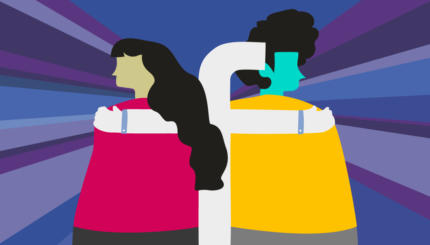Ten years ago, I couldn’t have imagined that I would be living in the state so devastated by the hurricane I was watching/not watching… Land Mass between New Orleans and Mobile, anyone?
Earlier this week, I heard former Mississippi Governor Haley Barbour speak about his time during the storm and recovery, highlighting his new book America’s Great Storm: Leading through Hurricane Katrina. He spoke without notes, telling anecdotes with an ease that comes from telling them often, but I couldn’t help but notice how often religion was weaved into each story. Not only did he use rhetoric about how a storm like this fit into God’s plan, but Barbour also spoke passionately about the massive religiously-based volunteer groups that helped clean up and rebuild the Gulf Coast.
One of Barbour’s favorite volunteer stories was about a Mormon company that built temporary housing for the Salt Lake City Olympics. They came to him, offering to build a facility that could sleep 700 volunteers in the state park in Hancock County. On the day they opened the facility, Barbour explained how while he expected to see a crowd of Mormons, he quickly realized that almost every Christian denomination was represented under one tent, sharing a meal, all in Mississippi because of a moral obligation and desire.
Then he mentioned a volunteer named George, from New York City ... I elbowed my coworker Abby: “This is us!” George told Barbour that he had called his son, a rabbi, and asked if he should come home for the High Holidays. His son told him not to, that he was closer to God where he was than he would be if he came home, and to keep doing what he was doing. If you’re interested in seeing him tell the story yourself I recommend it! I found a clip (skip to 5:10 if you just want to hear that particular anecdote).
When is Rosh Hashanah 2015? Click here to find out.
Clearly, it was a political speech given by an expert politician. But I did leave feeling reflective, and in many ways thankful, and also still thinking about those faith-based volunteers and what service can look like when it’s not centered around disaster relief. If George told the governor that he was glad he stayed in Mississippi instead of going home for , how can we replicate that same sense of obligation in our own community to make us feel like we are also doing holy work?
Luckily, Repair the World has provided some guidance! Its theme for this year’s High Holiday Season is “A Different Kind of High Holiday Service.” They are inviting folks to do “service” a little differently. Instead of, or in addition to, attending High Holiday services, Repair the World wants to empower individuals (like you!) to DO High Holiday Service. They have created a service campaign that focuses on inspiring communities to act for food justice: working to foster stronger local food systems, self-reliant communities, and a healthier environment, during the High Holidays. This campaign is a part of Hunger Action Month in September.
In partnership with Repair the World, the ISJL is reaching out to our Southern communities to join in inspiring service, in one or ALL of the following ways:
- Be a Movement Leader and plan your own Food Justice volunteer project (projects can be big or small, everything makes a difference!)–organizations or individuals can be Movement Leaders.
- Sign up to volunteer for a project in your local community
- Tell us about existing volunteer projects already scheduled in your area, and we will promote them on our Campaign Map
- Host a “Turn the Tables” Shabbat (or Holiday) Dinner on Food Justice (or incorporate the dinner guide into a meal you already have on the calendar) Turn the Tables will help make your Shabbat and high holidays even more meaningful by giving you the tools to host an important discussion about food justice.
- Test your knowledge and learn more by taking a Food Justice Quiz
This High Holiday and hurricane season, I’ll be thinking about the impact not only of local volunteers in a community, but also the type of cultural exchange and learning opportunity that a service project between people of different communities can elicit. The thoughtful materials designed by Repair the World are meant to do just that: inspire projects and conversations that replicate the camaraderie under that tent, created when people come together for the greater good.
I encourage you to visit their site and either sign up for a project or create your own, and tell us about what inspires you during this High Holiday season.
Jewish food, holidays, Torah, Shabbat, history, blogs and more in your inbox – sign up now!


